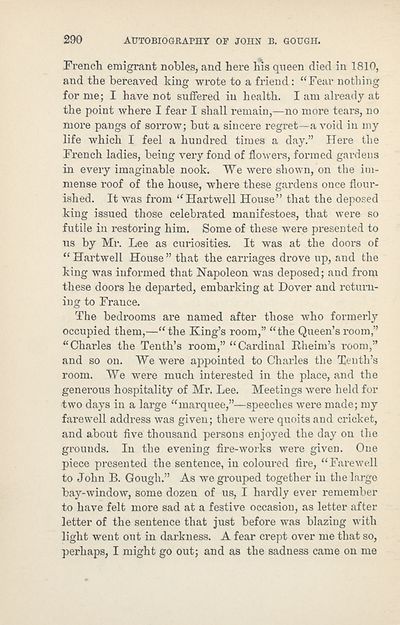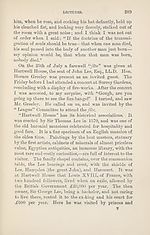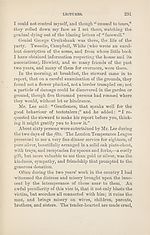Download files
Complete book:
Individual page:
Thumbnail gallery: Grid view | List view

290 AUTOBIOGRAPHY OP JOHN B. GOUGH.
French emigrant nobles, and here Ins queen died in 1810,
and the bereaved king wrote to a friend: “Fear nothing
for me; I have not suffered in health. I am already at
the point where I fear I shall remain,—no more tears, no
more pangs of sorrow; but a sincere regret—a void in my
life which I feel a hundred times a day.” Here the
French ladies, being very fond of flowers, formed gardens
in every imaginable nook. We were shown, on the im¬
mense roof of the house, where these gardens once flour¬
ished. It was from “Hartwell House” that the deposed
king issued those celebrated manifestoes, that were so
futile in restoring him. Some of these were presented to
us by Mr. Lee as curiosities. It was at the doors of
“ Hartwell House ” that the carriages drove up, and the
king was informed that Napoleon was deposed; and from
these doors he departed, embarking at Dover and return¬
ing to France.
The bedrooms are named after those who formerly
occupied them,—“ the King’s room,” “the Queen’s room,”
“Charles the Tenth’s room,” “Cardinal Eheim’s room,”
and so on. We were appointed to Charles the Tenth’s
room. We were much interested in the place, and the
generous hospitality of Mr. Lee. Meetings were held for
two days in a large “marquee,”—speeches were made; my
farewell address was given; there were quoits and cricket,
and about five thousand persons enjoyed the day on the
grounds. In the evening fire-works were given. One
piece presented the sentence, in coloured fire, “Farewell
to John B. Gough.” As we grouped together in the large
bay-window, some dozen of us, I hardly ever remember
to have felt more sad at a festive occasion, as letter after
letter of the sentence that just before was blazing with
light went out in darkness. A fear crept over me that so,
perhaps, I might go out; and as the sadness came on me
French emigrant nobles, and here Ins queen died in 1810,
and the bereaved king wrote to a friend: “Fear nothing
for me; I have not suffered in health. I am already at
the point where I fear I shall remain,—no more tears, no
more pangs of sorrow; but a sincere regret—a void in my
life which I feel a hundred times a day.” Here the
French ladies, being very fond of flowers, formed gardens
in every imaginable nook. We were shown, on the im¬
mense roof of the house, where these gardens once flour¬
ished. It was from “Hartwell House” that the deposed
king issued those celebrated manifestoes, that were so
futile in restoring him. Some of these were presented to
us by Mr. Lee as curiosities. It was at the doors of
“ Hartwell House ” that the carriages drove up, and the
king was informed that Napoleon was deposed; and from
these doors he departed, embarking at Dover and return¬
ing to France.
The bedrooms are named after those who formerly
occupied them,—“ the King’s room,” “the Queen’s room,”
“Charles the Tenth’s room,” “Cardinal Eheim’s room,”
and so on. We were appointed to Charles the Tenth’s
room. We were much interested in the place, and the
generous hospitality of Mr. Lee. Meetings were held for
two days in a large “marquee,”—speeches were made; my
farewell address was given; there were quoits and cricket,
and about five thousand persons enjoyed the day on the
grounds. In the evening fire-works were given. One
piece presented the sentence, in coloured fire, “Farewell
to John B. Gough.” As we grouped together in the large
bay-window, some dozen of us, I hardly ever remember
to have felt more sad at a festive occasion, as letter after
letter of the sentence that just before was blazing with
light went out in darkness. A fear crept over me that so,
perhaps, I might go out; and as the sadness came on me
Set display mode to:
![]() Universal Viewer |
Universal Viewer | ![]() Mirador |
Large image | Transcription
Mirador |
Large image | Transcription
| Antiquarian books of Scotland > Temperance > Autobiography and personal recollections of John B. Gough > (302) |
|---|
| Permanent URL | https://digital.nls.uk/125990993 |
|---|
| Description | Thousands of printed books from the Antiquarian Books of Scotland collection which dates from 1641 to the 1980s. The collection consists of 14,800 books which were published in Scotland or have a Scottish connection, e.g. through the author, printer or owner. Subjects covered include sport, education, diseases, adventure, occupations, Jacobites, politics and religion. Among the 29 languages represented are English, Gaelic, Italian, French, Russian and Swedish. |
|---|

